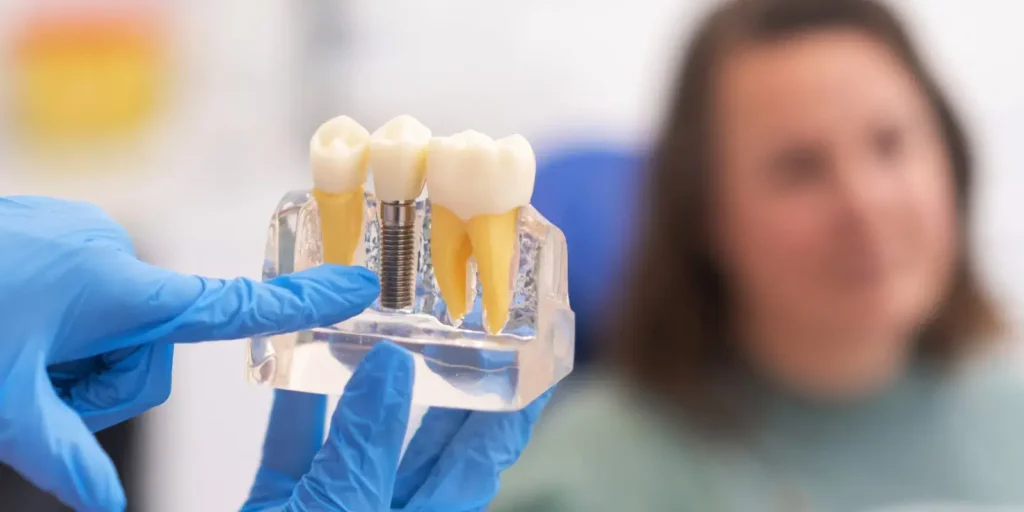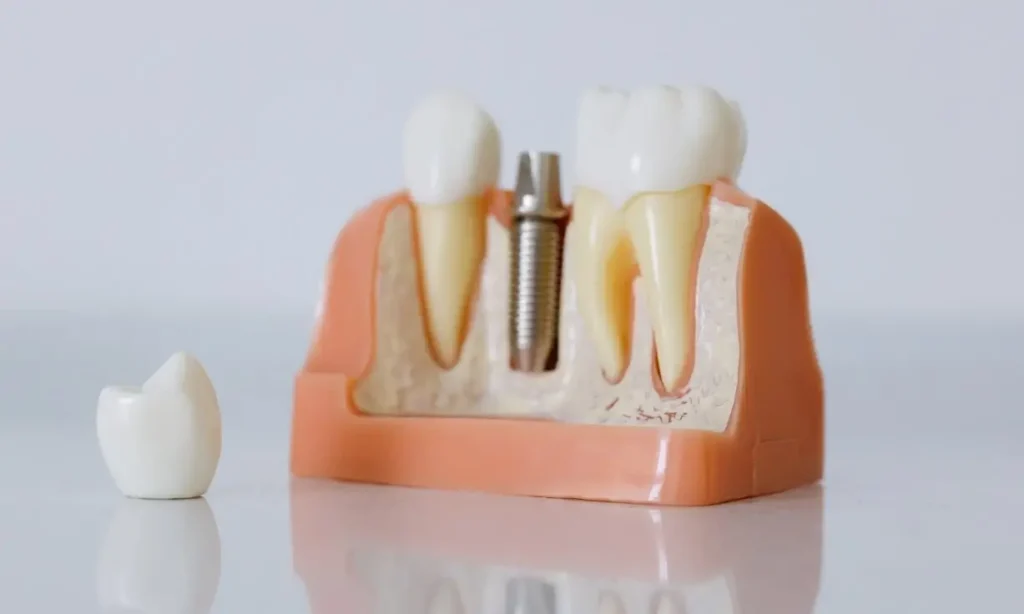Implant Care: Essential Tips to Protect Your Dental Investment
Implant care have revolutionized restorative dentistry, offering a durable and natural-looking solution for missing teeth. At FDental, we understand that investing in dental implants is a significant decision. To protect that investment and ensure a lifetime of optimal function and aesthetics, proper care and maintenance are crucial. In this comprehensive guide, we share expert tips on how to care for your dental implants, covering everything from daily hygiene practices to long-term lifestyle adjustments—all designed to extend the longevity of your implants and promote overall oral health.


Understanding Dental Implants
Dental implants are artificial tooth roots surgically placed into the jawbone, providing a stable base for crowns, bridges, or dentures. Unlike traditional dentures, implants offer several benefits:
- Stability and Functionality: Implants function like natural teeth, allowing you to eat, speak, and smile with confidence.
- Bone Preservation: The implant stimulates the jawbone, preventing bone loss that can occur with missing teeth.
- Aesthetic Appeal: Implants blend seamlessly with your existing teeth, enhancing the overall appearance of your smile.
However, even with their durability, dental implants require ongoing care to prevent complications such as peri-implantitis (an inflammatory condition affecting the soft and hard tissues around the implant) and to ensure the longevity of the implant and the prosthetic.
The Importance of Proper Dental Implant Care
Taking care of your dental implants is similar to maintaining natural teeth, but there are some additional considerations:
- Prevention of Infection: Meticulous oral hygiene helps prevent bacteria from causing infections around the implant.
- Maintenance of Bone Integrity: Good care supports the bone structure around the implant, which is vital for its long-term stability.
- Aesthetic Preservation: Regular cleaning prevents staining and buildup, ensuring your implant and surrounding teeth look their best.
- Cost-Effectiveness: Avoiding complications through proper care saves you from costly repairs or replacements in the future.
Daily Care Routine for Dental Implants
A consistent daily routine is essential to keep your dental implants in excellent condition. Here are the key steps to include in your oral hygiene regimen:
1. Brush Twice Daily
- Technique: Use a soft-bristled toothbrush or an electric toothbrush designed for implants. Brush gently using circular motions, making sure to clean all surfaces—front, back, and chewing surfaces—of your teeth and implants.
- Toothpaste: Use a fluoride toothpaste that is non-abrasive. Fluoride strengthens both natural teeth and the surrounding bone, helping to protect against decay.
- Duration: Brush for at least two minutes each time to ensure thorough cleaning.
2. Floss Daily
- Interdental Cleaning: Dental floss is essential for removing plaque and food particles from between your teeth and around your implants.
- Tools: Consider using floss designed for implants or interdental brushes, which may be easier to maneuver around implant crowns and bridges.
- Technique: Gently slide the floss between the teeth and along the gumline without snapping, which can irritate the soft tissues.
3. Use an Antibacterial Mouthwash
- Purpose: An alcohol-free, antibacterial mouthwash can help reduce bacterial load, minimizing the risk of peri-implant infections.
- Usage: Rinse once or twice daily, especially after brushing and flossing, to help maintain a healthy oral environment.
- Selection: Ask your dental professional for recommendations that suit your specific needs.
4. Maintain Regular Dental Cleanings
Even with excellent home care, professional cleanings are essential:
- Frequency: Schedule cleanings every six months, or as advised by your dentist.
- Specialized Care: Dental hygienists trained in implant maintenance use specialized tools to clean around the implant without damaging the surrounding tissues.
- Monitoring: Regular check-ups allow your dentist to monitor the condition of your implants and detect any early signs of complications.
Dietary Considerations for Dental Implant Longevity
Your diet plays an important role in the health of your dental implants. Making smart food choices can help preserve the integrity of the implant and support the surrounding tissues.
1. Eat a Balanced Diet
- Nutrient-Rich Foods: Focus on a diet rich in vitamins and minerals, particularly calcium and vitamin D, which are crucial for maintaining strong bones and supporting implant integration.
- Fruits and Vegetables: Include plenty of fresh produce to provide antioxidants and vitamins that help reduce inflammation and promote healing.
- Protein: Incorporate lean protein sources to aid tissue repair and maintain overall health.
2. Limit Sugary and Acidic Foods
- Sugars and Acids: Foods high in sugar and acid can lead to plaque buildup and contribute to gum inflammation.
- Smart Choices: Reduce consumption of soft drinks, candies, and citrus fruits, or consume them in moderation. When you do indulge, rinse your mouth with water afterward.
- Whole Foods: Opt for whole grains and unprocessed foods that are less likely to harm your implants.
3. Stay Hydrated
- Water Intake: Drinking plenty of water helps maintain saliva flow, which is essential for neutralizing acids and washing away food particles.
- Benefits: Adequate hydration supports overall oral health and helps keep the tissues around your implants healthy.
Lifestyle Factors Affecting Dental Implant Health
Beyond daily care and diet, your lifestyle choices can significantly impact the longevity of your dental implants.
1. Avoid Tobacco Products
- Impact on Implants: Smoking and other tobacco products reduce blood flow, impairing healing and increasing the risk of peri-implantitis.
- Recommendation: Quitting smoking or avoiding tobacco altogether is one of the best steps you can take to ensure the long-term success of your implants.
2. Limit Alcohol Consumption
- Dry Mouth: Excessive alcohol can lead to a dry mouth, reducing saliva production and increasing the risk of bacterial growth.
- Moderation: Limit alcohol intake and always follow up with water to help maintain moisture in your mouth.
3. Manage Stress
- Oral Health Connection: Chronic stress can negatively affect your immune system, making you more susceptible to infections, including those around your dental implants.
- Stress Reduction: Engage in stress-relieving activities such as exercise, meditation, or hobbies that help you relax and maintain a balanced lifestyle.
Additional Tips for Maintaining Dental Implant Longevity
1. Avoid Hard and Sticky Foods
- Risk of Damage: Chewing on hard objects like ice, hard candy, or even non-food items can damage your implant crown or cause fractures in the surrounding bone.
- Sticky Foods: Foods that are sticky or chewy can adhere to the implant surfaces and lead to plaque buildup.
- Dietary Adjustment: Choose foods that are gentle on your implants and that won’t compromise their integrity.
2. Wear a Mouthguard
- Protection During Sports: If you engage in contact sports or activities with a risk of impact, wear a custom-fitted mouthguard to protect your implants from trauma.
- Nighttime Protection: For patients who grind their teeth at night (bruxism), a nighttime mouthguard can help prevent excessive force on the implants and natural teeth.
3. Monitor Your Implant Site
- Self-Examination: Regularly check the area around your implants for any signs of redness, swelling, or discomfort.
- Early Detection: Noticing changes early can help you seek prompt treatment and prevent minor issues from developing into serious complications.
4. Follow Up with Your Dentist
- Regular Appointments: Continue to schedule regular check-ups with your dental professional to monitor the health of your implants.
- Professional Advice: Your dentist can provide personalized recommendations and adjustments to your care routine based on how well your implants are integrating and performing.
Addressing Common Concerns About Dental Implants
Peri-Implantitis Prevention
Peri-implantitis is an inflammatory condition affecting the tissues around dental implants. It is typically caused by plaque accumulation and inadequate oral hygiene. To prevent this condition:
- Meticulous Cleaning: Follow your daily oral care routine rigorously.
- Professional Monitoring: Have your dentist evaluate the implant site during regular check-ups to catch any early signs of inflammation.
Handling Implant Discomfort
Some minor discomfort after implant placement is normal during the initial healing phase. However, prolonged pain or discomfort may require professional attention.
- Pain Management: Use over-the-counter pain relievers as recommended by your dentist.
- Observation: If discomfort persists beyond the expected healing period, contact your dental professional for an evaluation.
Long-Term Maintenance
Long-term maintenance of dental implants is a partnership between you and your dental care provider. Following the recommended routine and promptly addressing any issues that arise will ensure that your implants continue to function well for many years.
The FDental Commitment to Your Implant Health
At FDental, our commitment extends beyond the surgical placement of dental implants. We are dedicated to providing ongoing support, education, and personalized care to help you maintain optimal oral health. Here’s how we stand by you throughout your dental implant journey:
- Comprehensive Consultations: Our dental professionals offer thorough assessments and personalized care plans tailored to your unique needs.
- Advanced Technology: We utilize the latest diagnostic and treatment technologies to monitor the health of your implants and surrounding tissues.
- Patient Education: FDental provides resources and guidance on best practices for implant care, empowering you to take an active role in your oral health.
- Continuous Support: From the initial consultation to regular follow-up visits, our team is here to answer your questions and address any concerns.
Conclusion
Caring for your dental implants is a lifelong commitment that involves daily attention, smart dietary choices, and a proactive lifestyle. By following a consistent oral hygiene routine, making informed dietary decisions, avoiding harmful habits, and staying in touch with your dental professional, you can significantly extend the longevity of your implants and enjoy a confident, healthy smile.
At FDental, we believe that preventive care is the cornerstone of long-term success. Our comprehensive approach to dental implant care not only preserves the functionality and aesthetics of your implants but also contributes to your overall well-being. Embrace these tips for implant care and make them a part of your daily routine to safeguard your investment and ensure that your smile remains bright for years to come.
If you have any questions or need personalized advice on caring for your dental implants, contact FDental today. Our team is here to provide you with the expert guidance and support you need to achieve lasting oral health. Remember, a healthy implant is the result of consistent care, informed choices, and ongoing professional support—invest in your smile every day!
